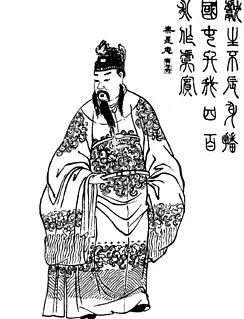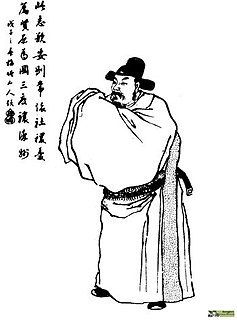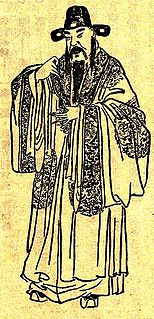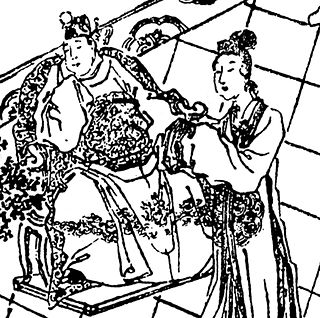Related Research Articles

Emperor Xian of Han, personal name Liu Xie (劉協), courtesy name Bohe, was the 14th and last emperor of the Eastern Han dynasty in China. He reigned from 28 September 189 until 11 December 220.

Dong Zhuo, courtesy name Zhongying, was a military general, politician, and warlord who lived in the late Eastern Han dynasty of China. At the end of the reign of the Eastern Han, Dong Zhuo was a general and powerful minister of the imperial government. Yet he forced the young Emperor Shao of Han to abdicate and replaced him with his half-brother Emperor Xian of Han while he sought to become the de facto ruler of China in the boy-emperor's name. The Eastern Han dynasty regime survived in name only.

Yuan Shao, courtesy name Benchu (本初), was a military general and warlord who lived in the late Eastern Han dynasty of China. He occupied the northern territories of China during the civil wars that occurred towards the end of the Han dynasty. He was also an elder half-brother of Yuan Shu, a warlord who controlled the Huai River region, though the two were not on good terms with each other.

He Jin, courtesy name Suigao, was a Chinese military general and politician. He was the military Grand marshal and regent of the late Eastern Han dynasty of China. He was an elder half-brother of Empress He, the empress consort of Emperor Ling, and a maternal uncle of Emperor Shao. In 189, he and his sister shared power as regents when the young Emperor Shao was put on the throne following Emperor Ling's death. During the time, the conflict between He Jin and the influential eunuch faction intensified. The eunuch faction lured He Jin into a trap in the imperial palace and assassinated him. While He Jin's subordinates slaughtered the eunuch faction in revenge, the warlord Dong Zhuo took advantage of the power vacuum to enter the imperial capital Luoyang and seize control of the Han central government. The subsequent breakdown of central command brought forth the beginning of massive civil wars which led to the end of the Han dynasty and the start of the Three Kingdoms period.

Wang Yun (137–192), courtesy name Zishi, was a Chinese politician who lived during the Eastern Han dynasty. He served in the Han government through the reigns of three emperors – Emperor Ling, Emperor Shao and Emperor Xian. The highest offices he served in were Manager of the Affairs of the Masters of Writing and Minister over the Masses in the early reign of Emperor Xian. In 192, with help from the general Lü Bu and others, he plotted a successful coup in Chang'an against Dong Zhuo, a tyrannical warlord who controlled the Han central government, and assassinated him. However, later that year, Dong Zhuo's followers staged a counter-coup and seized back control of the central government. Wang Yun, along with his family members, was captured and executed.

Li Jue, courtesy name Zhiran, was a Chinese military general, politician, and warlord serving under the autocratic warlord Dong Zhuo during the late Eastern Han dynasty of China. He later succeeded Dong Zhuo as the leader of the Liang Province faction after Dong Zhuo was murdered in a coup d'état, and was able to take over the Han imperial capital Chang'an, keeping Emperor Xian as a hostage. Despite being adept in military affairs, he was inept at politics, quarrelling with his fellow generals and making the bad decision to let Emperor Xian escape, greatly decreasing his power and precipitating his downfall.
Zhu Jun, courtesy name Gongwei, was a military general and official who lived during the Eastern Han dynasty of China.

Guo Si, also known as Guo Duo, was a Chinese military general, politician, and warlord serving under the warlord Dong Zhuo during the late Eastern Han dynasty of China. He assisted Dong Zhuo in his many campaigns and served as a subordinate of Dong Zhuo's son-in-law, Niu Fu, after Dong Zhuo relocated the imperial capital to Chang'an. He later became one of the de facto regents of Emperor Xian, wherein they occupied the capital and held the emperor and imperial officials hostage. However, his downfall came when he quarrelled with his co-regent, Li Jue. He and Li Jue were ultimately defeated by Yang Feng and Dong Cheng, who assisted the emperor to flee the capital. Guo Si was eventually betrayed and murdered by one of his subordinates.
Bao Xin (152–192) was a Chinese military general, politician, and warlord who lived during the late Eastern Han dynasty of China.

The end of the Han dynasty refers to the period of Chinese history from 189 to 220 CE, which roughly coincides with the tumultuous reign of the Han dynasty's last ruler, Emperor Xian. During this period, the country was thrown into turmoil by the Yellow Turban Rebellion (184–205). Meanwhile, the Han Empire's institutions were destroyed by the warlord Dong Zhuo and fractured into regional regimes ruled by various warlords, some of whom were nobles and officials of the Han imperial court. Eventually, one of those warlords, Cao Cao, was able to gradually reunify the empire, ostensibly under Emperor Xian's rule, but the empire was actually controlled by Cao Cao himself.

Fu Shou was an empress of the Eastern Han dynasty of China. She was the first wife of Emperor Xian, the last Han emperor. She is best known for initiating a conspiracy against Cao Cao, the ruler of state of Cao Wei.
Xu Rong was a military general serving under the warlord Dong Zhuo during the late Eastern Han dynasty of China.
Yang Feng was a military general who lived during the late Eastern Han dynasty of China.

The Campaign against Dong Zhuo was a punitive expedition initiated by a coalition of regional officials and warlords against the warlord Dong Zhuo in 190 in the late Eastern Han dynasty. The members of the coalition claimed that Dong had the intention of usurping the throne by holding Emperor Xian hostage and by establishing a strong influence in the imperial court. They justified their campaign as to remove Dong from power. The campaign led to the evacuation of the capital Luoyang and the shifting of the imperial court to Chang'an. It was a prelude to the end of the Han dynasty and, subsequently, the Three Kingdoms period.
Niu Fu was a military general serving under the warlord Dong Zhuo during the late Eastern Han dynasty of China.
Han Xian was a bandit leader and military general who lived during the late Eastern Han dynasty of China.
Zhang Ji was a military general serving under the warlord Dong Zhuo during the late Eastern Han dynasty of China.
Zhang Yang, courtesy name Zhishu, was an official and minor warlord who lived during the late Eastern Han dynasty of China. Originally from Yunzhong Commandery in the north, he eventually became the de facto ruler of Henei Commandery. Although threatened by powerful warlords such as Cao Cao and Yuan Shao, Zhang Yang still provided refuge for Emperor Xian of Han numerous times, eventually attaining the rank of Grand Marshal (大司馬).
Chen Ji (129–199), courtesy name Yuanfang, was an official and scholar who lived during the Eastern Han dynasty of China.

The Battle of Chang'an, also known as the Sack of Chang'an, took place in the western Chinese imperial capital city of Chang'an on 28 June 192, at the end of the Han Dynasty, the prelude of the Three Kingdoms.
References
- Chen, Shou (3rd century). Records of the Three Kingdoms (Sanguozhi).
- Fan, Ye (5th century). Book of the Later Han (Houhanshu).
- Pei, Songzhi (5th century). Annotations to Records of the Three Kingdoms (Sanguozhi zhu).